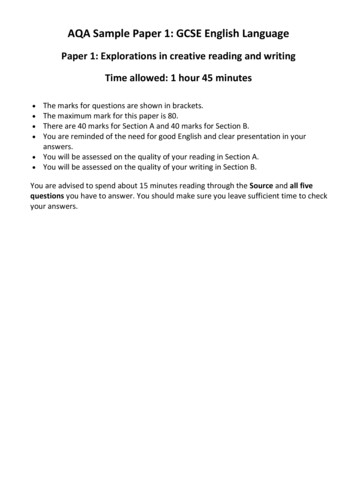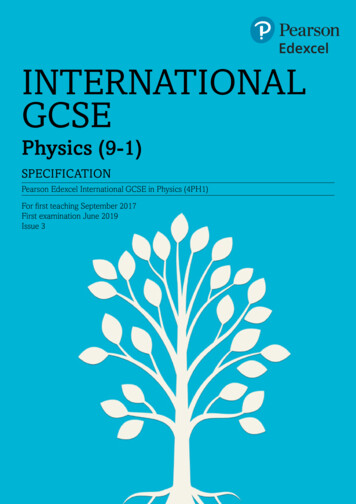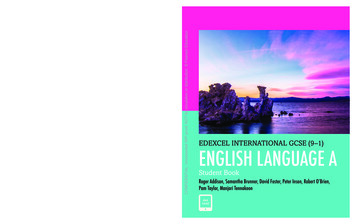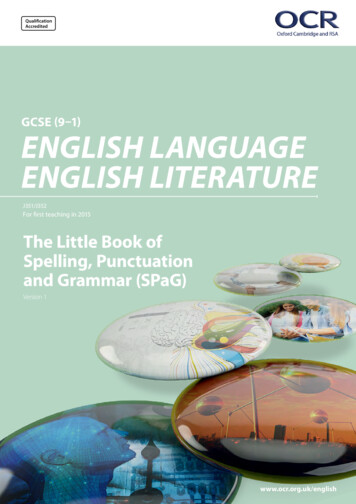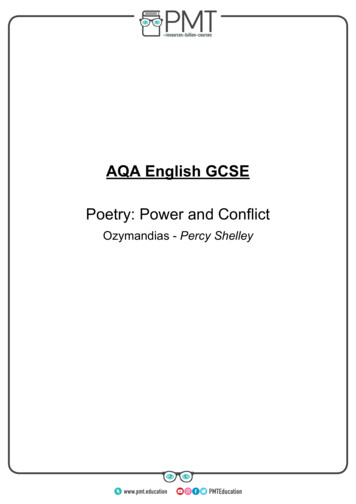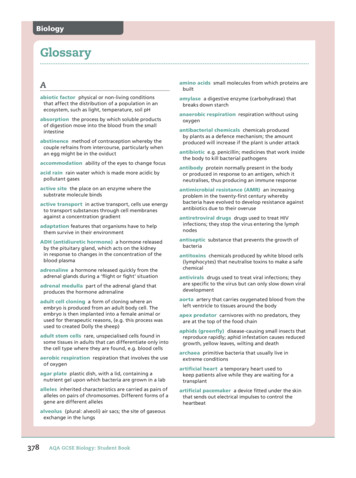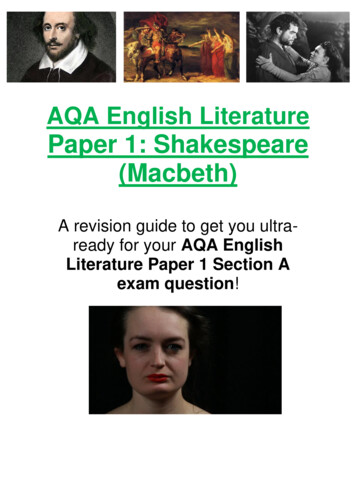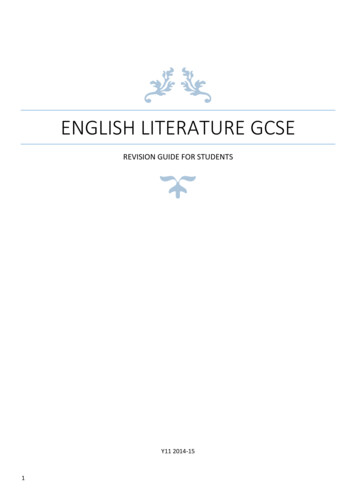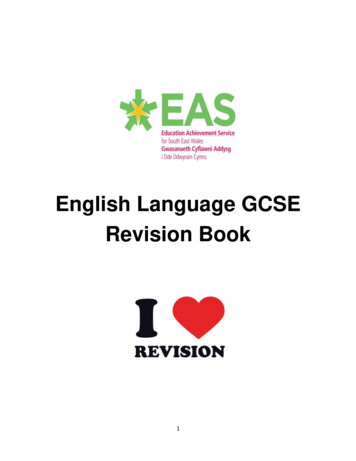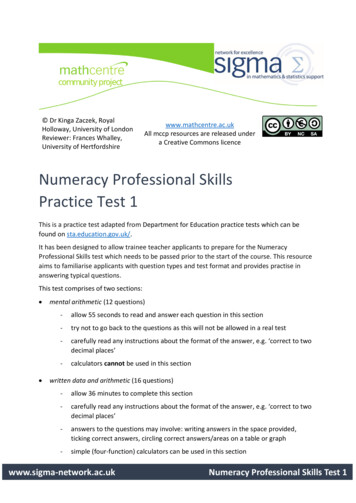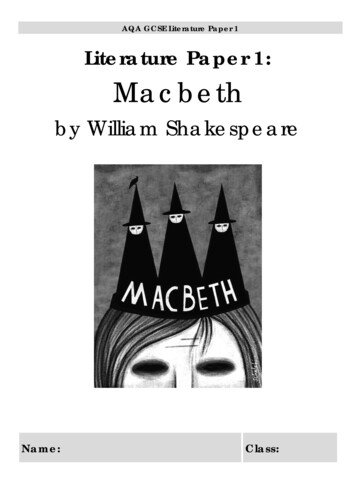
Transcription
AQA GCSE Literature Paper 1Literature Paper 1:Macbethby William ShakespeareName:Class:
CONTENTS:1. Week 1: Plot Revision6-15a. Act 16-7b. Act 28-9c. Act 310-11d. Act 412-13e. Act 514-152. Key Theme 1: Ambition16-25a. Context: Shakespearean beliefs about kingship16-17b. A1S5: “Come you spirits ”18-19c. A1S7: “If it were done when ‘tis done ”20-21d. A3S1: “Is this a dagger ”22-23e. Exam Practice24-253. Key Theme 2: The Supernatural26-35a. Context: Shakespearean beliefs about witchcraft26-27b. A1S3: “Two truths are told ”28-29c. A3S4: “What man dare, I dare ”30-31d. A4S1: “Be bloody, bold and resolute ”32-33e. Exam Practice34-354. Key Theme 3: Power and Corruption36-45a. Context: Macbeth’s historical background36-37b. A3S1: “Our fears in Banquo / Stick deep ”38-39c. A3S6: “The son of Duncan ”40-412
d. A5S3: “Bring me no more reports ”42-43e. Exam Practice44-455. Key Theme 4: Gender46-55a. Context: Shakespearean beliefs about gender roles46-47b. A1S7: “Prithee, peace ”48-49c. A2S2: “I’ll go no more ”50-51d. A5S1: “Out, damned spot! ”52-53e. Exam Practice54-556. Key Theme 5: Fate and Free Will56-65a. Context: Fate, free will and the tragic hero56-57b. A4S1: “Be lion-mettled ”58-59c. A5S5: “She should have died hereafter ”60-61d. A5S8: “Accursed be that tongue ”62-63e. Exam Practice64-657. Knowledge Organiser: Key Quotations and Revision366-67
Act 1 RevisionDNA: How is Macbeth viewed at the beginning of the play and why?a) Reading the ActRead pages 6-22 to remind yourself what happened in Act 1 of Macbeth.b) Act 1 Cloze ActivityFill in the blanks to test your knowledge on what happens in each chapterKing Duncan hears how has been a brave warrior whilst fightingthe Norwegians. Duncan gives Macbeth the title of Thane of asreward for his valour. The old Thane is sentenced to death for being a traitor.On their way back from battle, Macbeth and Banquo meet thewho tell Macbeth that he will become the new Thane of Cawdor and alsothe new of Scotland. The weird sisters tell Banquo that hisdescendants will be the future of Scotland. Macbeth is not surewhether this is true, but he is soon told by a messenger that he is now the newThis seems like the first part of the prophecy has come true.Macbeth sends a letter to his wife, about the witches'predictions. She is excited about becoming queen, but fears that Macbeth isnot enough to kill Duncan. When Macbeth arrives home shetries to him to kill Duncan. Macbeth eventually agrees with her.Duncan arrives at castle and is greeted by the hosts. They holda feast and most people get drunk. Macbeth is about killingDuncan and decides to abandon his plan. Macbeth believes that Duncan isa king and he comments that Duncan has oftenMacbeth. Lady Macbeth is angry that Macbeth has abandoned his plan tokill Duncan and calls him a . Macbeth decides to go throughwith the plan to murder Duncan.rulersgoodweird sistersLady ouspraisedcowardthaneCawdor
c) Act 1 Short Answer Questions:1. What news does the blood-stained captain bring to the king at thebeginning of the Act? What is the result of this news?2. What is the witches’ prophecy to Macbeth and Banquo?3. How does Banquo’s reaction to the witches differ from Macbeth’s? Whatdoes this suggest about each man’s character?4. Describe the differences in the demeanour of Macbeth and LadyMacbeth. How does this relate to Elizabethan gender roles?Plenary: Which theme is most prominent in this act (ambition, supernatural,power and corruption, gender or fate and free will)? Explain why below.5
Act 2 RevisionDNA: What is Macbeth’s state of mind at the end of Act 1 and why?a) Reading the ActRead pages 23-30 to remind yourself what happened in Act 2 of Macbeth.b) Act 2 Cloze ActivityFill in the blanks to test your knowledge on what happens in each chapterLater that night, whilst approaching Duncan’s room, Macbeth sees afloating before his eyes. He follows the dagger to Duncan’sroom. Macbeth creeps inside and him in cold blood. LadyMacbeth meets him in the hall and him for showing fear. Whenshe sees the daggers in Macbeth’s hands shethem to the sleeping grooms withMacduff arrives at the castle and discovers the and raisesthe alarm. Duncan’s sons, and quicklyleave Scotland because they might be of killing their father.Macduff does not Macbeth and suspects that Macbethmight have something to do with it.murdersbelieveMalcolmDonalbainaccuseddead kingmockssmearbloodydaggerbloodsnatchesc) Act 2 Short Answer Questions:1. What vision does Macbeth have at the beginning of Act 2? Why do youthink this hallucination occurs?6
2. How does Lady Macbeth react to Macbeth after the murder? What doesthis reveal about their relationship?3. How do Macbeth and Lady Macbeth cover up their guilt the followingmorning?4. Where do Malcolm and Donalbain decide to go and why?Plenary: Which theme is most prominent in this act (ambition, supernatural,power and corruption, gender or fate and free will)? Explain why below.7
Act 3 RevisionDNA: What is the biggest threat to Macbeth as he becomes king and why?a) Reading the ActRead pages 31-38 to remind yourself what happened in Act 3 of Macbeth.b) Act 3 Cloze ActivityFill in the blanks to test your knowledge on what happens in each chapterMacbeth is made of Scotland. The witches’ prophecy makesMacbeth believe that he must kill and his son ,because the witches that Banquo’s descendants would be. Macbeth orders two to carry out the job.However, escapes and this makes Macbeth very angry andconcerned that the witches’ predictions could come .Macbeth has a banquet and sets a place at the table forknowing full well that he is . However, he sees the ofBanquo in the seat left for him. Macbeth shouts in at the ghost.His guests suspect that he has a eprophesiedFleanceFleancedeadkinghorrord) Act 3 Short Answer Questions:1. How and why does Macbeth arrange Banquo’s murder?8
2. What role does Lady Macbeth play in Banquo’s murder? How does thissuggest a change in their relationship? Why might this change haveoccurred?3. How is Fleance’s escape a turning point in the play? What impact do youthink this has on Macbeth’s state of mind and why?4. After seeing Banquo’s ghost, Macbeth says “Blood will have blood”. Whatdo you think this means and why is it significant to the play?Plenary: Which theme is most prominent in this act (ambition, supernatural,power and corruption, gender or fate and free will)? Explain why below.9
Act 4 RevisionDNA: Why do you think Macbeth saw Banquo’s ghost at the banquet? Whatdoes this reveal about his state of mind?a) Reading the ActRead pages 39-47 to remind yourself what happened in Act 4 of Macbeth.b) Act 4 Cloze ActivityFill in the blanks to test your knowledge on what happens in each chapterMacbeth decides to pay the witches another visit and they show him three. The first is an (this represents Macbeth’sown severed head, later), the second is a (who is likely to beMacduff torn from his mother’s womb), and the third is awith a tree in its hand (this is meant to represent Malcolm and Birnam Wood).The first apparition tells Macbeth to beware , the second thathe will never be defeated by anyone born of , and the thirdtells Macbeth that he will never be beaten until comes toDunsinane.Macduff is sure that Macbeth has murdered Duncan and decides to joinin England. He raises an army of Englishmenin order to kill Macbeth and reclaim the throne.In rage that Macduff has fled the country, Macbeth orders his henchmen tokill Macduff’s and this act disgusts his followers, who start todesert him.armoured headfamilyMacduffbloody childMalcolmten thousandapparitionsBirnam woodcrowned childwomana) Act 4 Short Answer Questions:1. What has Macbeth come to ask the witches? How do they answer?10
2. How has Macbeth changed since he last saw the witches? How has ismoral character deteriorated? Do you think the witches are to blame?3. Why do you think Shakespeare had Macbeth murder Macduff’s wife andchildren? What does this symbolise about his character?4. According to Malcolm and Macduff, what has happened to Scotlandduring Macbeth’s reign? What do you think Shakespeare’s messageabout kingship is here?Plenary: Which theme is most prominent in this act (ambition, supernatural,power and corruption, gender or fate and free will)? Explain why below.11
Act 5 RevisionDNA: How do you think the witches’ apparitions have affected Macbeth as heprepares for battle with the English army?a) Reading the ActRead pages 48-60 to remind yourself what happened in Act 5 of Macbeth.b) Act 5 Cloze ActivityFill in the blanks to test your knowledge on what happens in each chapterLady Macbeth has been driven into with and. She obsessively as she talks in her sleepabout .Macbeth is preparing for battle with the English army. He feelsdue to the . Macbeth is informed that Lady Macbeth hasand he begins to question the point of .A messenger tells the king that the wood is on its way to andMacbeth becomes .When the army arrives at the castle, Macbeth recklessly attacks andmany men because he believes that no one can kill him. However, Macdufftells Macbeth that he was not born of because he was born of. they start to fight. Macduff Macbeth and hisis displayed for everyone to see. is crowned thetrue king of Scotland.guiltdefeatspropheciesexistencewashes her handsMacbeth’s betrayalmadnessgriefworriedinvinciblecommitted suicidekillscaesareanwomanDunsinaneheadMalcolma) Act 5 Short Answer Questions:1. Why do you think Shakespeare shows Lady Macbeth sleepwalking?12
2. What opinion do the Scottish lords now have of Macbeth and why?3. In Act 5 Macbeth talks a lot about his perspective on life. What do thesespeeches reveal about his state of mind?4. Why do you think Shakespeare makes Lady Macbeth die at this point inthe play? What does Macbeth’s response reveal about his state of mind?5. Why does Macduff not take power for himself at the end of the play?What message do you think Shakespeare is trying to give us here?Plenary: Which theme is most prominent in this act (ambition, supernatural,power and corruption, gender or fate and free will)? Explain why below.13
Key Theme 1: AmbitionKey Context: Shakespearean Beliefs about KingshipDuring the reign of King James I, people in England and Scotland believed strongly in aking's divine right to rule. They believed that kings were higher beings who were chosenby God (and not by men) to rule. In Macbeth, Shakespeare shows that a king should bechosen by divine right through the unnatural events that happen following Macbeth’susurpation (theft) of the throne. He is ultimately punished for his murder of the divinelyappointed King Duncan and his theft of the throne.According to the theory of divine right, God grants kings the right to rule. An uprisingagainst the king is therefore an uprising against the will of God. King Duncan is presentedas a noble King of Scotland. He is a good and fair King, who loves his country more thanhis own power. When Macbeth and Lady Macbeth murder Duncan due to their corruptambition and desire for power, this is a rebellion against God and a disruption of thenatural order. This disruption of nature is also shown in Lady Macbeth’s refusal of hergender role, the supernatural changes in the landscape, and the couple’s deterioratingmental health, until Macduff restores the natural order by returning the throne toDuncan’s son and named heir, Malcolm.Once Macbeth gives in to his ambition and steals the throne, he upsets the natural orderof things by taking a position that is not his by right. Macbeth is unable to be a good kingbecause of his defiance of God and nature, and his ambition drives him to commitfurther crimes to keep himself on the throne: the murders of Banquo, Lady Macduff, andher son. Kings were meant to protect their countries from evil, but Macbeth cannot fulfillthis role; he does not prevent evil but causes it.The land begins to reflect this evil in its king through supernatural occurrences. The land iscovered in darkness and nothing can grow without the light of the sun. The land nolonger has a true king to care for it, only a murderous usurper who continues to kill andthe strange landscape reflects this.Macbeth has made the land diseased through his own corrupt ambition because hehas murdered its divinely-chosen king and has stolen the throne for himself. In doing so,he has become a tyrant, killing his subjects to maintain his power. When Macbeth hearsthat Birnam Wood is moving against him, it seems as if the land itself is revolting againsthis unnatural reign. At this moment, he knows that the prophecy has been fulfilled, andhe will be defeated.Although Macbeth and Lady Macbeth are powerful in their corrupt ambition, they areunable to fight against nature. Macbeth is defeated by the forces of Malcolm, therightful king, and Macduff, his faithful servant. Malcolm becomes a king with the right torule both because he is the son of Duncan, who was a true king, and because he hasnot murdered the innocent or otherwise gone against nature to gain his position.Malcolm is chosen by God, able to lead Scotland in a way that Macbeth cannot. WithMacbeth’s death and Malcolm's rise to the throne, the natural order is restored and theland can begin to heal itself under the guidance of a king who cares for his kingdom.14
DNA: Read the contextual information in silence.Kingship Context: Short Answer Questions:1. In your own words, explain what is meant by the “divine right” of kings:2. How does Shakespeare show that Macbeth is does not have the divineright of kingship?3. How is the disruption of the natural order of things shown in Macbeth?4. How does the landscape react to Macbeth’s usurpation of the throne?5. How is the natural order restored at the end of the play?Plenary: List three relevant events from the play that demonstrate the themeof ambition. Give reasons for your choices.15
Ambition: Key Scene (A1 Sc5)Read the following extract from Act 1 Scene 5 and then answer the questionthat follows.LADY MACBETHThe raven himself is hoarseThat croaks the fatal entrance of DuncanUnder my battlements. Come, you spiritsThat tend on mortal thoughts, unsex me here,5And fill me from the crown to the toe top-fullOf direst cruelty! make thick my blood;Stop up the access and passage to remorse,That no compunctious visitings of natureShake my fell purpose, nor keep peace between10The effect and it! Come to my woman's breasts,And take my milk for gall, you murdering ministers,Wherever in your sightless substancesYou wait on nature's mischief! Come, thick night,And pall thee in the dunnest smoke of hell,15That my keen knife see not the wound it makes,Nor heaven peep through the blanket of the dark,To cry 'Hold, hold!'Starting with this speech, explain how far you think Shakespeare01presents Lady Macbeth as an ambitious character in the play.Write about: how Shakespeare presents Lady Macbeth in this speech how Shakespeare presents Lady Macbeth as an ambitiouscharacter in the play as a whole.[30 marks]16
DNA: Summarise what has happened directly before this speech takes place.Notes:Plenary: Choose one quote from the extract and analyse how the theme ofambition is presented by zooming in on language.17
Ambition: Key Scene (A1S7)Read the following extract from Act 1 Scene 7 and then answer the questionthat follows.MACBETHIf it were done when 'tis done, then 'twere wellIt were done quickly: if the assassinationCould trammel up the consequence, and catchWith his surcease success; that but this blow5Might be the be-all and the end-all here,But here, upon this bank and shoal of time,We'ld jump the life to come. But in these casesWe still have judgment here; that we but teachBloody instructions, which, being taught, return10To plague the inventor: this even-handed justiceCommends the ingredients of our poison'd chaliceTo our own lips.Starting with this speech, explain how far you think Shakespeare01presents Macbeth as corrupted by ambition.Write about: how Shakespeare presents Macbeth in this speech how Shakespeare presents Macbeth as corrupted by ambition inthe play as a whole.[30 marks]18
DNA: Summarise what has happened directly before this speech takes place.Notes:Plenary: Choose one quote from the extract and analyse how the theme ofambition is presented by zooming in on language.19
Ambition: Key Scene (A2S1)Read the following extract from Act 2 Scene 1 and then answer the questionthat follows.MACBETHIs this a dagger which I see before me,The handle toward my hand? Come, let me clutch thee.I have thee not, and yet I see thee still.Art thou not, fatal vision, sensible5To feeling as to sight? or art thou butA dagger of the mind, a false creation,Proceeding from the heat-oppressed brain?I see thee yet, in form as palpableAs this which now I draw.10Thou marshall'st me the way that I was going;And such an instrument I was to use.Mine eyes are made the fools o' the other senses,Or else worth all the rest; I see thee still,And on thy blade and dudgeon gouts of blood,15Which was not so before. There's no such thing:It is the bloody business which informsThus to mine eyes.Starting with this speech, explain how far you think Shakespeare01presents Macbeth’s ambition as the main reason for his downfall.Write about: how Shakespeare presents Macbeth’s ambition in this speech how Shakespeare presents Macbeth’s ambition in the play as awhole.[30 marks]20
DNA: Summarise what has happened directly before this speech takes place.Notes:Plenary: Choose one quote from the extract and analyse how the theme ofambition is presented by zooming in on language.21
Ambition: Exam PracticeChoose one of the extracts that we have discussed as a class this week. Writean answer to your chosen question below.22
23
Key Theme 2: The SupernaturalKey Context: Shakespearean Beliefs about WitchcraftThe Elizabethans had a strong belief in witchcraft. They blamed witches for any eventsthat they could not control or explain. This led to the persecution of witches; hundreds of‘witches’ were hunted, prosecuted and killed in the 15th and 16th centuries. Followingthe outbreak of the Bubonic Plague, Elizabethans blamed witches for its spread. Similarly,whenever there were bad harvests, fires that burnt down houses or when foods werespoiled, the blame was targeted at witches.Witches were associated with the dark and death. In Christian countries they werethought to be the servants of Satan (the devil), and they were believed to gather neargraves to conduct their evil rites and make poisons.There were lots of ways to test for a witch. A common way was to duck the accusedunder water in a pond or river. If she floated, she was a witch. If she didn’t, she wasinnocent and probably drowned. Anyone who floated was then burnt at the stake.Since the rich and the powerful sections of the Elizabethan society could not betouched, it was the old, poor, unprotected and hapless women who were accused ofbeing witches. Out of 270 witches who were put on trial, 247 were women and 23 men.Of these women, most were single women who kept pets for company. The pets wereconsidered demons, and a source of witchcraft.Another reason that more women than men were targeted for witchcraft was that theElizabethan society was patriarchal (male-dominated). Men were all-powerful andwomen enjoyed few rights. They were expected to be obedient to men. Elizabethanwomen totally relied on the male members of the family.Since there were no trained doctors around at this time, people often turned to ‘wisewomen’ who used herbs to cure their illnesses. As the fear of witches and witchcraftincreased, however, the Catholic Church extended its definition of witchcraft to includeanyone with the knowledge of herbs. It was alleged that these people had pact withthe Devil. Those who cured the health problems with psychedelic herbs were burnt atthe stake.King James I became king in 1603. He was particularly superstitious about witches andeven wrote a book on the subject. Shakespeare wrote Macbeth especially to appeal toJames – it has witches and is set in Scotland, where he was already king. The threewitches in Macbeth manipulate the characters and cast spells to destroy lives.Witches were supposed to be capable of doing all the things that the three ‘weirdsisters’ are said to perform in Macbeth. It was believed that they could see into thefuture, change the weather, sink ships, dry up springs, change night into day and dayinto night. They could also cause the death of their enemies, and could makethemselves invisible. For a king like Macbeth to visit and have dealings with witcheswould have seemed both a crime and a sin.Macbeth is easily captured by their power and by their prophecies. But note that theynever tell him a lie. However, they do allow him to deceive himself. The devil does notlie.but leads us into temptation.24
DNA: Read the contextual information in silence.The Supernatural Context: Short Answer Questions:1. In your own words, name three things that Elizabethans blamed witchesfor:2. How did they test for witches and what was the punishment?3. Which people were usually accused of being witches and why?4. In your own words, explain what patriarchal means:5. Name five things the witches were able to do in Macbeth:Plenary: List three relevant events from the play that demonstrate the themeof the supernatural. Give reasons for your choices.25
The Supernatural: Key Scene (A1S3)Read the following extract from Act 1 Scene 3 and then answer the questionthat follows.MACBETH[Aside] Two truths are told,As happy prologues to the swelling actOf the imperial theme. — I thank you, gentlemen.Aside5This supernatural solicitingCannot be ill, cannot be good: if ill,Why hath it given me earnest of success,Commencing in a truth? I am thane of Cawdor:If good, why do I yield to that suggestion10Whose horrid image doth unfix my hairAnd make my seated heart knock at my ribs,Against the use of nature? Present fearsAre less than horrible imaginings:My thought, whose murder yet is but fantastical,15Shakes so my single state of man that functionIs smother'd in surmise, and nothing isBut what is not.Starting with this speech, explain how far you think Shakespeare01presents the witches’ prophecies as the main reason for Macbeth’sdownfall in the play.Write about: how Shakespeare presents prophecy in this speech how Shakespeare presents prophecy in the play as a whole.[30 marks]26
DNA: Summarise what has happened directly before this speech takes place.Notes:Plenary: Choose one quote from the extract and analyse how the theme ofthe supernatural is presented by zooming in on language.27
The Supernatural: Key Scene (A3S4)Read the following extract from Act 3 Scene 4 and then answer the questionthat follows.MACBETHWhat man dare, I dare:Approach thou like the rugged Russian bear,The arm'd rhinoceros, or the Hyrcan tiger;Take any shape but that, and my firm nerves5Shall never tremble: or be alive again,And dare me to the desert with thy sword;If trembling I inhabit then, protest meThe baby of a girl. Hence, horrible shadow!Unreal mockery, hence!10GHOST OF BANQUO vanishesWhy, so: being gone,I am a man again. Pray you, sit still.LADY MACBETHYou have displaced the mirth, broke the goodmeeting,15With most admired disorder.Starting with this speech, explain how far you think Shakespeare01presents hallucinations as the symbol of Macbeth’s guilt.Write about: how Shakespeare presents hallucinations in this speech how Shakespeare presents hallucinations in the play as a whole.[30 marks]28
DNA: Summarise what has happened directly before this speech takes place.Notes:Plenary: Choose one quote from the extract and analyse how the theme ofthe supernatural is presented by zooming in on language.29
The Supernatural: Key Scene (A4S1)Read the following extract from Act 4 Scene 1 and then answer the questionthat follows.SECOND APPARITIONBe bloody, bold, and resolute; laugh to scornThe power of man, for none of woman bornShall harm Macbeth.5DescendsMACBETHThen live, Macduff: what need I fear of thee?But yet I'll make assurance double sure,And take a bond of fate: thou shalt not live;10That I may tell pale-hearted fear it lies,And sleep in spite of thunder.Starting with this speech, explain how far you think Shakespeare01presents Macbeth as manipulated by supernatural powers.Write about: how Shakespeare presents supernatural powers in this speech how Shakespeare presents supernatural powers in the play as awhole.[30 marks]30
DNA: Summarise what has happened directly before this speech takes place.Notes:Plenary: Choose one quote from the extract and analyse how the theme ofthe supernatural is presented by zooming in on language.31
The Supernatural: Exam PracticeChoose one of the extracts that we have discussed as a class this week. Writean answer to your chosen question below.32
33
Key Theme 3: Power and CorruptionKey Context: Macbeth’s Historical BackgroundShakespeare wrote Macbeth in 1606. It is important to understand the historical andpolitical context in which it was written, as that is the key to the main theme of the play,which is that excessive ambition will have terrible consequences, driving any illegitimatepossession of power into corruption. When James I became king after the death ofElizabeth I in 1603, he was not a direct descendent. Queen Elizabeth I had died withoutchildren, nephews or nieces; James I was a distant cousin and her nearest relation. Forthis reason, there were many people who were unhappy with his coronation as king andclaimed the throne for themselves. Shakespeare wrote Macbeth partly as a cautionarytale, warning any other potential regicides (king-killers) of the awful fate that wouldinevitably overtake them. This is one reason why Macbeth is often referred to as a tyrantin the play, a word which has two meanings. A tyrant is both a usurper – someone whohad seized power without any legal right to do so – and a ruler who exercises theirpower in a harsh cruel way. Macbeth’s brutal murder at the hand of Macduff is awarning to anyone who might consider killing James I, as Macbeth had killed KingDuncan.During the reign of Queen Elizabeth, Shakespeare's acting company was called the'Chamberlain's Men', and it is known that they performed for the court. After James I wascrowned, they changed their name to the 'King's Men' as a tribute to him. Shakespeareneeded to stay in favour with the King and his court so that he could afford to keepwriting and producing plays. In Macbeth, Shakespeare seeks to flatter and please theKing in various ways. Macbeth, the character who usurps the place of a lawful King, isshown as losing everything as a result – he becomes hated and demonised by all hissubjects, as does his wife, who supports him in his crime. Banquo, who James I claimedas their ancestor, is presented in a completely positive light. When the witches showMacbeth the future, he sees a line of kings descended from Banquo that seems to'stretch out to the crack of doom'. This flatters King James with the promise of a longstanding dynasty. He also included many supernatural elements to entertain James I,who believed strongly in witchcraft.Shakespeare based the story of Macbeth on a real Scottish king, Mac Bethad (orMacbeth in English). Mac Bethad did kill the previous king, Duncan, then ruled the Scotsfrom 1040-1057. He eventually died in a battle that returned Duncan’s son Malcolm tothe throne.Shakespeare probably read about Mac Bethad in a history book by Raphael Holinshed,which included the witches and their predictions, Lady Macbeth’s role in the murderand the moving of Birnam Wood. Shakespeare changed the story even further bymaking Macbeth’s reign shorter and more evil. In the history books, Banquo helpedMacbeth murder Duncan, but Shakespeare presents Banquo as a wise, noble figurewho makes Macbeth jealous as much for his goodness as for the witches’ prophecies.This was partly because King James I claimed to be descended from Banquo, and partlyto provide a contrast for the audience between the evil, murderous masculinity ofMacbeth and Banquo’s more moral, noble manliness.34
DNA: Read the contextual information in silence.Historical Context: Short Answer Questions:1. Why was James I’s throne threatened when he was crowned?2. How does Shakespeare react to this situation in Macbeth?3. Why does Shakespeare make Macbeth a tyrant?4. How does Shakespeare flatter James I in Macbeth?5. How does Shakespeare use history books in the plot of Macbeth?Plenary: List three relevant events from the play that demonstrate the themeof power and corruption. Give reasons for your choices.35
Power and Corruption: Key Scene (A3S1)Read the following extract from Act 3 Scene 1 and then answer the questionthat follows.MACBETHTo be thus is nothing;But to be safely thus. — Our fears in BanquoStick deep; and in his royalty of natureReigns that which would be fear'd: 'tis much he dares;5And, to that dauntless temper of his mind,He hath a wisdom that doth guide his valourTo act in safety. There is none but heWhose being I do fear: and, unde
6. Key Theme 5: Fate and Free Will 56-65 a. Context: Fate, free will and the tragic hero 56-57 b. A4S1: “Be lion -mettled ” 58-59 c. A5S5: “She should have died hereafter ” 60-61 d. A5S8: “Accursed be that tongue ” 62-63 e. Exam Practice 64-65
